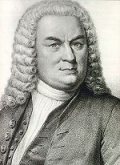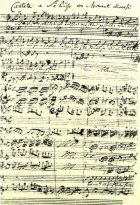
Johann Sebastian Bach
The townsfolk of Leipzig in the early 1700's were overcome by a powerful and exotic addiction to a substance recently introduced from the New World. While much of the population were smitten by the bug, many others viewed is with suspicion and thought it dangerous to the health.
Coffee, that roasted, ground and percolated bean of the
Coffea arabica plant was the new fad of the century. But what an unlikely inspiration for a Cantata by Johann Sebastian Bach! What's the story?
Bach was a career musician. Almost everything he wrote was for a practical purpose. Employed by the church, his main job was to write a sacred
Cantata for the Lutheran service every Sunday. He wrote hundreds of them, at least five complete annual cycles, of which over 200 survive.
The
Cantata is quite a varied work, with a mixture of
Recitative or narration, combined with solo
Arias, mixed
Arias, orchestral interludes and
Chorales. Their role was to make simple religious messages appeal to the general public. Much of the music from the
Cantatas has become famous in their own right:
Jesu, Joy of Man's Desiring,
Sheep May Safely Graze,
Sleepers Wake and
A Mighty Fortress is our God are all movements from Bach
Cantatas.
But what possessed Bach to write a
Cantata about so secular and even banal a topic as coffee?

Opening Page of Bach's Coffee Cantata
From 1729, Bach assumed direction of Leipzig's
Collegium Musicum, founded by Telemann in 1702. The
Collegium was a group of student musicians who met each Friday evening at Zimmermann's Coffee-House to give concerts.
It is very likely that some of Bach's best-known secular works, such as the harpsichord concerti and orchestral suites were written for and premiered by the
Collegium. And it is certainly for this group of musicians that Bach wrote the
Coffee Cantata.
The
Coffee Cantata is lighthearted, as close as Bach comes to comic opera, in which he pokes fun at both coffee drinkers and their old-fashioned critics.
The story concerns the father Herr Schlendrian (“Mr Routine”) portrayed by a plodding lead-footed melody, and his daughter Lieschen, the coffee-lover. She is introduced by a lively and beguiliing
Aria.
In an effort to rid his daughter of the evil drink, he progressively forbids her her luxuries. Lieschen refuses to give it up, saying that coffee is “
more delicious than a thousand kisses, and sweeter than muscatel wine”. It is only when Schlendrian refuses to allow her to marry that she relents. But even then, as the father goes off to find a husband, Lieschen reveals that she will make it a part of the marriage contract that she be allowed her three cups a day.
Read the full English and German lyrics.
This is a charming introduction to Bach's Cantatas, with friendly melodies, cleverly reflecting the characters' personalities. And generously includes the other popular secular cantata the
Peasant Cantata with its infectiously enjoyable tunes, Bach letting his hair down and obviously having much fun.
Please support Good-Music-Guide.com
by purchasing this CD using this link.

Track Listing
Johann Sebastian Bach
Coffee Cantata BWV 211
Peasant Cantata BWV 212
Durchlauchtster Leopold BWV 173a
les Violons du Roy de Quebec
Bernard Labadie
Dorothea Röschmann,
Soprano
Hugues Saint-Gelais,
Tenor
Kevin McMillan,
Baritone
Serenata Durchlauchtster Leopold, BWV 173a
- Recit: Durchlauchtster Leopold
- Aria: Güldner Sonnen frohe Stunden
- Aria: Leopolds Vortrefflichkeiten
- Aria: Unter seinem Purpursaum
- Recit: Durchlauchtigster, den Anhalt Vater nennt
- Aria: So schau dies holden Tages Licht
- Aria: Dein Name gleich der Sonnen geh
- Chorus: Nimm auch, großer Fürst, uns auf
Schweigt stille, plaudert nicht, BWV 211
(Coffee Cantata / Cantate du café)
- Recit: Schweigt stille, plaudert nicht
- Aria: Hat man nicht mit seinen Kindern
- Recit: Du böses Kind, du loses Mädchen
- Aria: Ei ! wie schmeckt der Coffee süße
- Recit: Wenn du mir nicht den Coffee läßt
- Aria: Mädchen, die von harten Sinnen
- Recit: Nun folge, was dein Vater spricht !
- Aria: Heute noch, lieber Vater, tut es doch
- Recit: Nun geht und sucht der alte Schlendrian
- Chorus: Die Katze läßt das Mausen nicht
Cantate burlesque Mer hahn en neue Oberkeet, BWV 212
(Peasant Cantata / Cantate paysanne)
- Sinfonia
- Aria (duetto): Mer hahn en neue Oberkeet
- Recit: Nu, Mieke, gib dein Guschel immer her !
- Aria: Ach, es schmeckt doch gar zu gut
- Recit: Der Herr ist gut
- Aria: Ach, Herr Schößer, geht nicht gar zu schlimm
- Recit: Es bleibt dabei
- Aria: Unser trefflicher lieber Kammerherr
- Recit: Er hilft uns allen, alt und jung
- Aria: Das ist galant
- Recit: Und unsre gnädge Frau
- Aria: Fünfzig Taler bares Geld
- Recit: Im Ernst ein Wort !
- Aria: Klein-Zschocher müsse
- Recit: Das ist zu klug für dich
- Aria col Corne de Chasse: Es nehme zehntausend Dukaten
- Recit: Das klingt zu liederlich
- Aria: Gib, Schöne
- Recit: Du hast wohl recht
- Aria:Dein Wachstum sei feste
- Recit: Und damit sei es auch genung
- Aria: Und daß ihrs alle wißt
- Recit: Mein Schatz ! erraten !
- Chor: Wir gehn nun, wo der Tudelsack